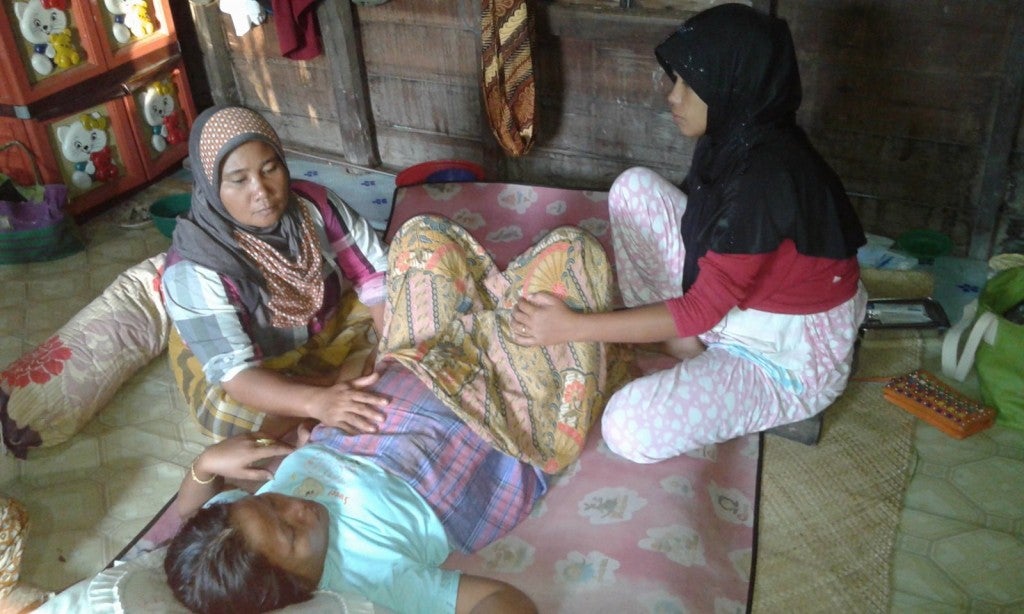Last week, I had the great privilege of attending the first-ever Global Maternal Newborn Health Conference (GMNHC) in Mexico City. During a panel on midwifery around the world, I presented on a successful partnership program between midwives and traditional birth attendants (TBAs) in the remote district of Aceh Singkil, Indonesia.
Maternal death is common in Aceh Singkil. Its 110,000 residents are served by 11 basic health clinics (puskesmas). Only one health clinic has in-patient facilities, and only two are certified as being able to manage basic obstetric and neonatal emergencies. There is one public hospital, but it does not meet the standards to handle comprehensive emergencies. In 2010, 38% of babies were born with the assistance of TBAs, mostly because TBAs are affordable, speak local languages, understand local customs, and make pregnant and delivering women feel comfortable.

The government of Aceh Singkil wants to encourage more women to give birth with the assistance of medically-trained midwives and in health facilities. One method of doing so has already been widely-adopted in Indonesia, with varying levels of success: working partnerships between midwives and TBA, in which TBAs refer pregnant women to midwives for medical care.
In supporting the establishment of midwife-TBA partnerships, Kinerja (a USAID-funded governance project) worked with the local government and NGO partners to ensure that the principles of good governance were well-embedded, focusing on transparency, accountability, responsiveness, and public participation.
What worked in Aceh Singkil:
- A District Head Regulation on Safe Childbirth was developed and made into law. The regulation outlines the duties and responsibilities of the government, health facilities, health professionals, and the community.
- A series of public workshops were held to identify maternal health problems in the district, and to develop the model of midwife-TBA partnerships, including agreeing on the rights and responsibilities of midwives and TBAs. The workshops were open to all, and were attended by hundreds of people.
- Public events were held when the MoUs between midwives and TBAs were signed. Local community members were encouraged to attend, and MoUs were co-signed by village heads and the head of the District Health Office to give the partnerships formal status.
- Sub-district Health Committees – made up of community members – were established to help monitor the midwife-TBA partnerships and receive feedback.
- A strong incentive mechanism was established for TBAs. This was crucial, as TBAs would otherwise lose their income if they were no longer able to assist childbirth. It was agreed that TBAs would receive both a monthly honorarium (as long as they did not individually assist women to give birth) and incentives for every birth they referred to a midwife.
- TBAs are permitted and encouraged to attend births alongside midwives. Midwives provide the medical care, while TBAs provide spiritual and traditional care such as prayers and massage. TBAs can also assist when language problems arise.
In 2013, partnerships were expanded from just 2 pilot villages to another 29 villages. After one year of implementation, antenatal care visits rose by 10% on average, while midwife-assisted deliveries rose by as much as 11% at one facility and by 6% at two others. In the original pilot villages, births assisted by TBAs fell from 17 in 2011 to 0 in 2014.
What did I learn at GMNHC 2015 that could be incorporated into midwife-TBA partnerships in Aceh Singkil?
- Community-led maternal death audits could increase public participation and lead to more accountability. CommonHealth India’s Subha Sri B gave a wonderful presentation on the Dead Women Talking project which sparked many ideas on this topic.
- Midwives’ skills should be independently-assessed following graduation, as many lack the knowledge and confidence needed to provide crucial medical care. Jhpiego’s Tegbar Yigzaw researched this issue in Ethiopia, and found that midwifery students’ average competence score was just over 50%.
- On-the-job mentoring can dramatically boost skills, confidence, and the use of tools such as dashboards, as demonstrated by Dr Rikmasari in Indonesia.
- Increased financial support must be allocated so that more women can access antenatal care, as Nosa Orobaton of JSI in Nigeria argued in one of the first day’s plenaries.
